My 2007 Game Developers Conference lecture was about the creature animation system for Spore, the game I'm working on at Maxis/Electronic Arts. Spore presents some really cool and interesting challenges because of the way the players will make the assets for the game after we've shipped it.
Here's the abstract:
Spore has a unique problem: most of the content in the game will be made after the game ships. This includes the animated creatures, which can have almost arbitrary shapes and skeleton topology...my creature might have two arms and one leg, yours might have no arms and seven legs, and two mouths. How can we animate these creatures when we haven't seen them before, and hopefully animate them well enough to convey emotions? How do we let animators use their skills "today" in a way we can apply "later" to the user's creature? This lecture will discuss the various approaches we used to procedurally animate user-created creatures in Spore, and what worked and what didn't, along with some suggestions about how some of the techniques might benefit other more traditional games.
Here are the materials:
- The slides. This lecture is one of my new-style lectures, which means lots of images, less text, and almost no equations, so you probably need the audio below to follow along and get much out of it. I also did a lot of demos during the lecture using Spasm, our animation tool, so unfortunately some of the value is going to be missing.
- The mp3 audio of the lecture.
- Our related SIGGRAPH 2008 paper, Real-time Motion Retargeting to Highly Varied User-Created Morphologies, a much more detailed and technical explanation of the system.






